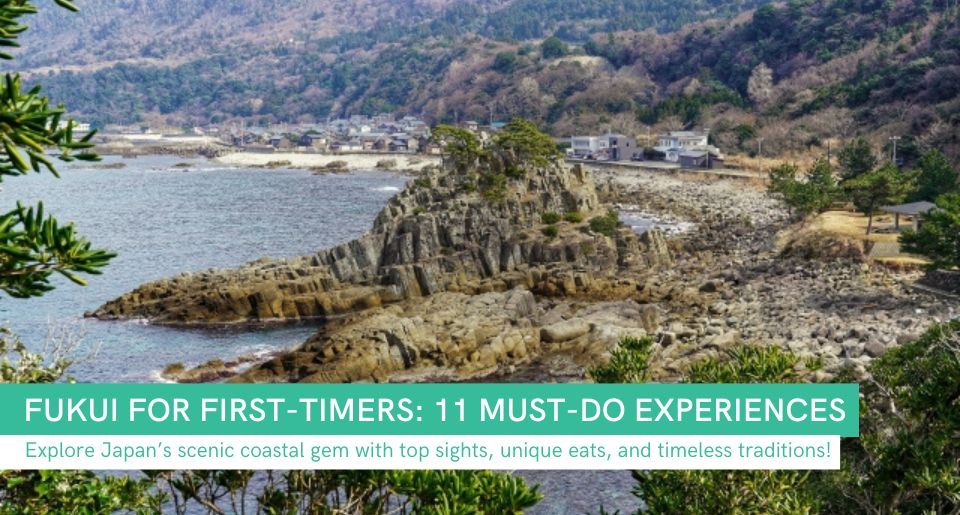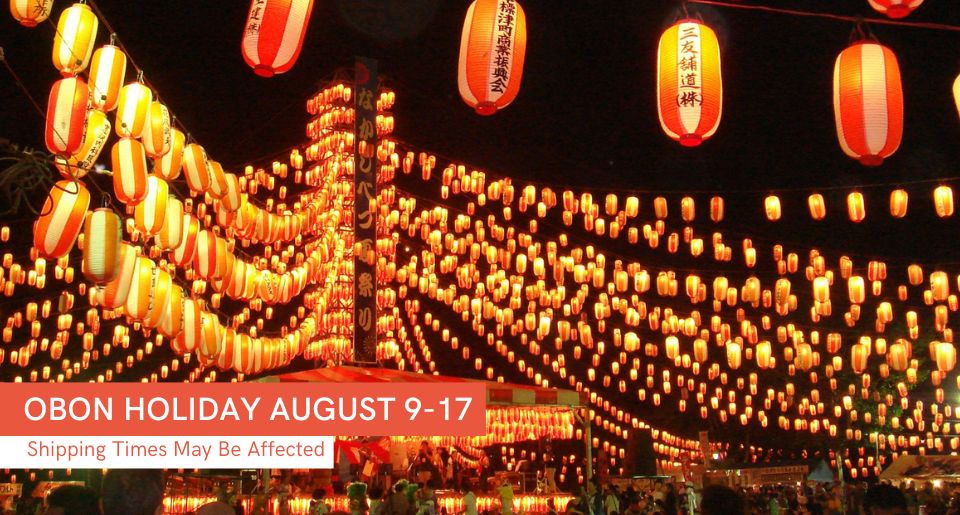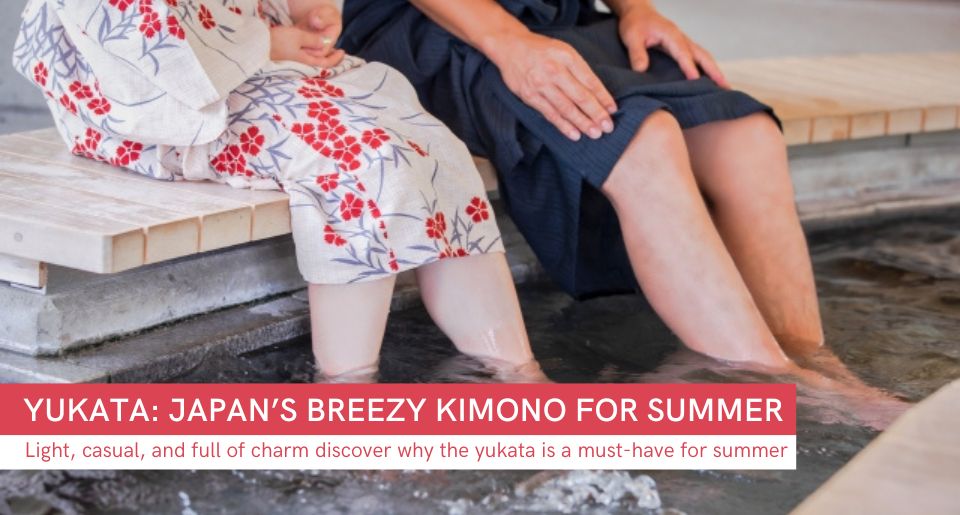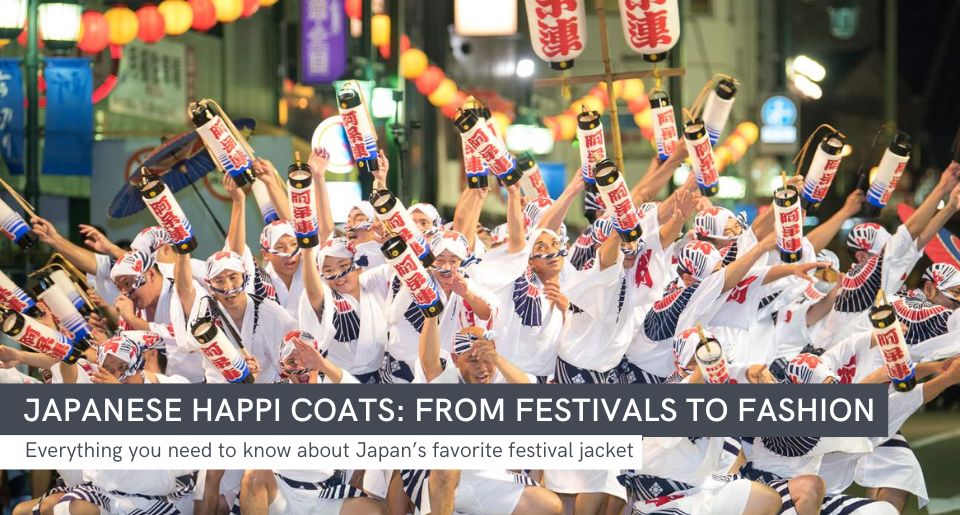Contents
- Introduction
- Welcome to Japan's hidden gem—Fukui
- First things first—come see Eiheiji's ancient charm!
- Explore Tojinbo’s spectacular seaside cliffs
- Fukui locals LOVE their deep-fried tofu—and so will you!
- Savor the best somen noodles in Fukui!
- Don’t leave Fukui without trying the famous Habutae Mochi!
- Satisfy your sweet cravings with sweet red bean jelly
- Step into the world of dinosaurs (frighteningly realistic!)
- Sail through Fukui's five blue lakes
- Embark on a spiritual journey at Heisenji Hakusan Shrine
- Get your hands on exclusive local craftsmanship in Fukui
- Ichijodani Asakura Ruins: Definitely a must-see!
- Should you visit Fukui?
- Shop Fukui’s Best Online
Introduction
While Fukui may fly under the radar compared to other Japanese cities, it's actually packed with unique activities and sights exclusive to the region.
From its rare traditional crafts to its enchanting sites nestled in forested hills and along rugged coastlines, there's an abundance of adventures to be had. Let's dive into the myriad of experiences Fukui has in store!
Welcome to Japan's hidden gem—Fukui
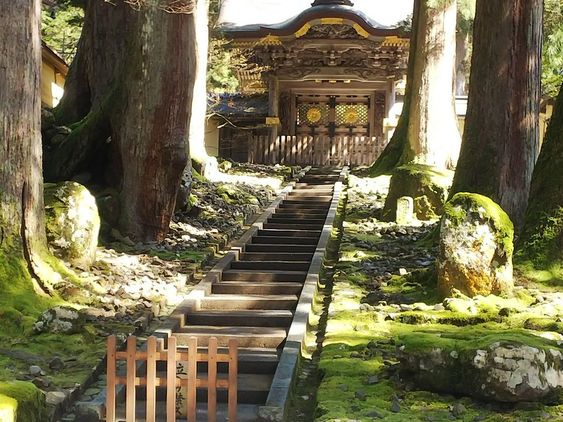
Image source: Pinterest
Nestled in Japan, Fukui serves as the charming capital of Fukui Prefecture. This city is a treasure trove of experiences, from its stunning vistas over the Sea of Japan to its mouth-watering cuisine, inspired by the natural bounty of both mountains and sea.
If you’re into history or nature, Fukui is also the place to be, boasting the globally acclaimed dinosaur museum, the ancient craft of Echizen pottery, and the serene grounds of the Eiheiji Temple.
First things first—come see Eiheiji's ancient charm!
One of the first stops you should make in the region is Eiheiji, known as "The Temple of Eternal Peace." As one of the two head temples of Soto Zen, it holds a profound place in spiritual history.
Located deep in the mountains near the northwest coast, not far from Fukui City, this temple was founded in 1244 by the Zen Master Dōgen, with the support of Yoshishige Hatano, a devoted samurai follower.
Today, Eiheiji remains a vibrant center of Zen practice, where over a hundred monks dedicate themselves to the practice of shikantaza ("single-minded sitting").
The temple complex, featuring over 70 buildings connected by covered walkways to shield against the region's heavy snow, is as practical as it is beautiful.
The lush vegetation in warmer months and the peak of autumn colors from late October to early November add to its timeless charm, making Eiheiji a must-visit destination that instantly transports you to ancient Japan.
Explore Tojinbo’s spectacular seaside cliffs
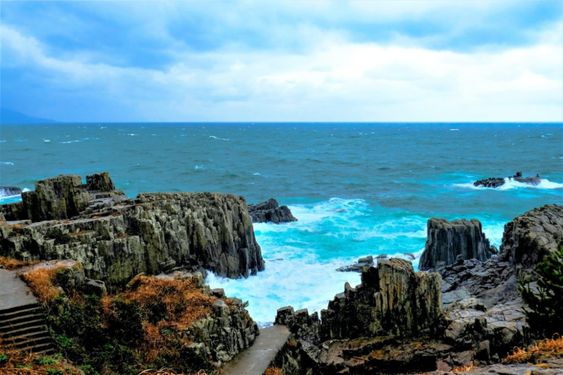
Image source: Pinterest
Tojinbo Cliffs, a designated natural monument of Japan, stand as one of the top three most beautiful sights globally. These majestic cliffs, perched along the coastline of the Sea of Japan in Fukui Prefecture, offer a breathtaking panorama that captivates visitors with their raw, dramatic beauty.
Renowned for both their natural splendor and cultural significance, the Tojinbo Cliffs are an essential stop for anyone touring Fukui. Their towering presence and the mesmerizing views they provide make them an unforgettable highlight of the region.
Whether you're a nature lover, a photography enthusiast, or just looking to soak in some scenic vistas, Tojinbo Cliffs are a definite highlight that shouldn't be missed!
Fukui locals LOVE their deep-fried tofu—and so will you!
Abura-age (AKA deep-fried tofu) is more than just a popular food in Fukui City—it's a cultural phenomenon. According to the Ministry of Internal Affairs and Communications' 2017-2019 household budget survey, Fukui City consumes more Abura-age than any other region in Japan.
This iconic food is made by deep-frying thin slices of tofu until they puff up, creating perfect pouches often used in inari-zushi or added to miso soup.
Its widespread appeal in Fukui isn't surprising; it's irresistibly tasty and fits perfectly into the vegetarian diets of the region's Buddhist monks. Local cuisine takes it a step further, introducing innovative dishes such as aburaage burgers and more—you really can’t go wrong with these deep-fried babies!
Savor the best somen noodles in Fukui!
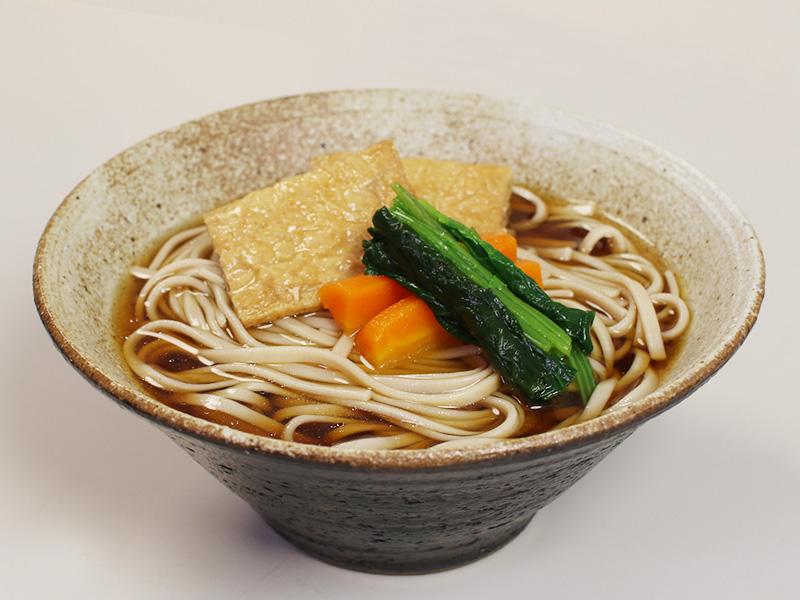
Dried Japan-made soba noodles featured on ZenPlus
Make the most of your visit to Fukui by enjoying its renowned noodle dishes!
Noodle lovers exploring Fukui shouldn't pass up the chance to try Japanese somen noodles from Tomoyoshi-Seimen. This company has mastered the art of dried noodles, delivering a product that rivals fresh noodles in texture and taste, all while being free of additives and artificial colors.
The company offers a delightful array of noodle dishes from Fukui, featuring the Echizen Somen, crafted from 100% Japanese wheat flour. Enjoy 18 packs of these traditional noodles, perfect for sharing or savoring solo.
Don't miss the Bamboo Charcoal Somen, a health-boosting specialty exclusive to Fukui, designed to detoxify your body with its high vitamin and mineral content. For a nutrient-rich option, try the Komatsuna Somen, packed with vitamins from Japanese mustard spinach.
Their noodles are proudly made without additives or artificial colors, using only the purest Japanese water. It's the ideal way to ensure your visit is complete with top-quality meals that keep you satisfied and ready to explore!
Don’t leave Fukui without trying the famous Habutae Mochi!
For a delightful souvenir, travelers often choose none other than Habutae Mochi, also called neri-mochi (kneaded mochi)—a famed sweet you should not miss from Fukui.
Originating from Fukui Prefecture, these thin, smooth, and white glutinous rice cakes are filled with a delightful sweetness and are light and soft that they melt right in your mouth!
Available at Fukui Station, the Happiring shopping center, and even online stores like ZenPlus, Habutae Mochi comes in delicious varieties like strawberry and chocolate—each are equally enticing, so you might consider sampling every one!
Satisfy your sweet cravings with sweet red bean jelly
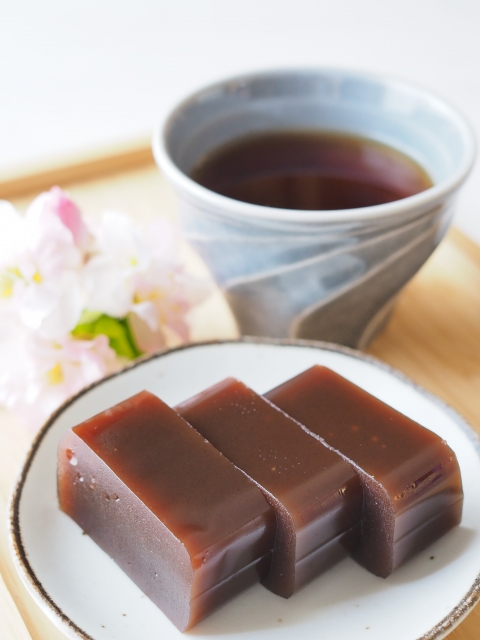
While in Fukui, don't miss the chance to indulge in a local dessert favorite—Yōkan. This sweet red bean jelly is a staple in Japanese cuisine, often enjoyed chilled during the summer months. However, in Fukui Prefecture, there's a unique twist to this tradition: locals savor Mizu Yokan warm under the kotatsu during the winter.
In Fukui, you'll find numerous shops offering their own versions of Mizu Yokan, but one standout is the "Egawa" shop. Founded in 1950, this specialty shop produces Mizu Yokan using only four select ingredients: anko (sweet red bean paste), agar, rough sugar, and exclusive brown sugar from Okinawa—truly a simple recipe for happiness!
Step into the world of dinosaurs (frighteningly realistic!)
【新】福井県立恐竜博物館が凄すぎた… Fukui Prefectural Dinosaur Museum!
A trip to Fukui isn't complete without visiting one of the world's premier dinosaur museums. Nestled in Katsuyama, Fukui—Japan's dinosaur fossil hotbed—the Fukui Prefectural Dinosaur Museum offers an expansive space free of pillars, brimming with awe-inspiring dinosaur skeletons, ancient animal and plant fossils, and life-like dioramas.
In the museum, you get to experience the thrill of up-close encounters with dynamic dinosaur animatronics, showcasing powerful and lifelike movements.
Step back in time at Dinosaur World, where everything dinosaur comes to life across multiple engaging sections.
Key areas include the "Biology of Dinosaurs," "Dinosaurs of Japan and Asia," and a breathtaking "Real-size Dinosaur Diorama" that features a Jurassic forest, complete with moving dinosaur animatronics and vivid computer-generated imagery.
The "Dinosaur Hall" is a highlight with 50 full-scale dinosaur skeletons. Impressively, ten of these skeletons incorporate a large amount of authentic fossil material. The most remarkable is the Camarasaurus, assembled using more than 90 percent original fossils—a truly spectacular sight.
Adjacent to the museum is the Field Station, the site of Japan's largest Dinosaur Discovery Site (Dinosaur Quarry). This area is rich in history, having yielded numerous dinosaur fossils, including five species previously unknown to science.
Definitely a trip worth taking—don’t miss out!
Sail through Fukui's five blue lakes
Embark on a tranquil journey through Fukui's Mikata Five Lakes, a serene collection of lakes nestled in the southern towns of Mikata and Mikatakaminaka.
As part of the esteemed Wakasa Wan Quasi-National Park and recognized by the Ramsar Convention, these lakes are a true haven for nature lovers. The varying depths and compositions lend each lake a unique hue of blue, creating mesmerizing views that change with the seasons.
Each season brings a new reason to visit, from spring's soft plum blossoms to autumn's fiery maple foliage, making the lakes a year-round destination for scenic beauty.
The ideal way to fully appreciate the beauty of the Mikata Five Lakes is undoubtedly by boat. Various boat tours are available, providing visitors with the opportunity to explore multiple lakes, as they are interconnected by channels and canals.
The mix of freshwater and ocean water in these lakes supports a diverse aquatic community, making your trip to Mikata Five Lakes even more remarkable.
Embark on a spiritual journey at Heisenji Hakusan Shrine
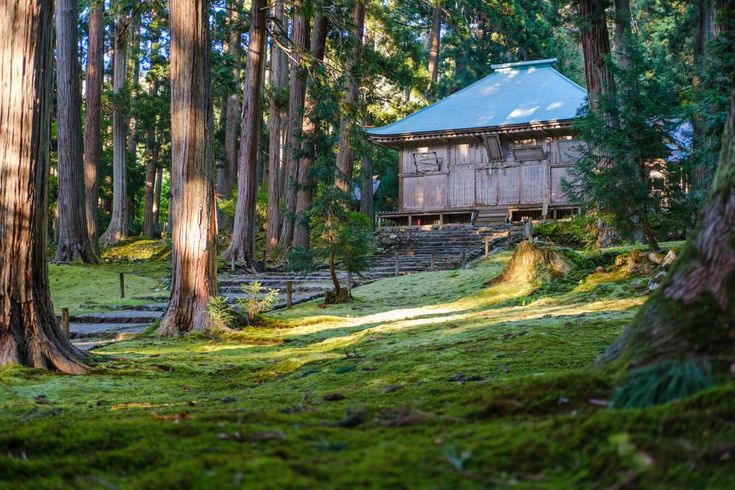
Image source: Pinterest
For those captivated by the mystique of ancient Japan (and really, who isn't?) a visit to Heisenji Hakusan Shrine is a non-negotiable. Tucked away at the forested base of Mount Hakusan in Katsuyama City, Fukui Prefecture, this shrine offers a profoundly atmospheric experience in the city.
Originally founded in 717 as a Buddhist temple, Heisenji Hakusan Shrine served as a vital pilgrimage site to the sacred Mount Hakusan. By the 1500s, it had evolved into a sprawling temple complex, bustling with thousands of monks and warrior monks.
Today, it's celebrated for its moss-covered surroundings and serene, almost otherworldly atmosphere, making it a perfect retreat for those looking to connect with Japan's spiritual and historical roots.
Get your hands on exclusive local craftsmanship in Fukui
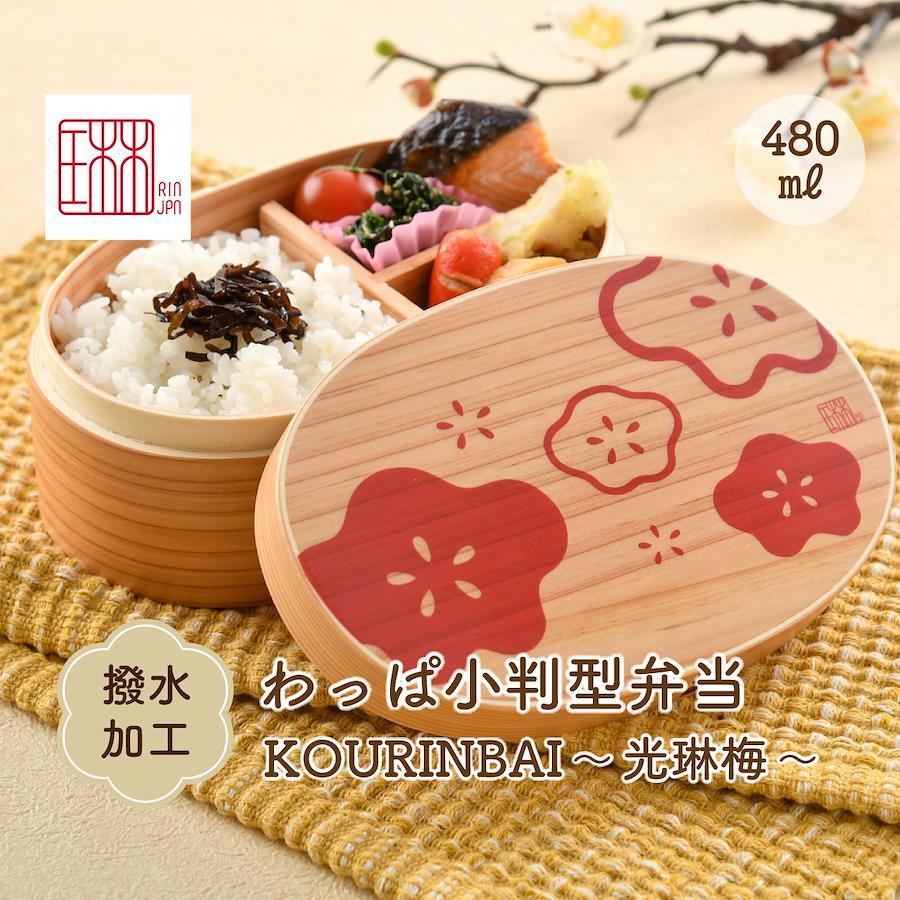
Wooden wappa oval bento box featured on ZenPlus
While exploring Fukui, make sure to check out Matsuya Lacquerware. This esteemed company has been celebrating the beauty of Echizen lacquerware since 1905, blending traditional craftsmanship with designs suited for contemporary living.
Also, Shitsurin Crafts offers a refreshing take on the classic "wappa" bento boxes, making your lunchtime more relaxing and culturally enriched.
And for a touch of luxury, check out the Yamazaki Velvet Industry, where traditional materials meet cutting-edge technology to create world-class velvet!
Ichijodani Asakura Ruins: Definitely a must-see!
For history buffs and cultural enthusiasts visiting Fukui, the Ichijodani Asakura Clan Historic Ruins are a must-see. These ruins mark the site of the former Ichijodani Castle Town, which flourished during the Muromachi Period as a hub of cultural, military, and commercial activity.
Home to the influential Asakura Clan, the town boasted a population of over 10,000 at its peak. However, in 1573, the town met a tragic fate when Oda Nobunaga burned it to the ground.
Excavations, which started in 1967, nearly four centuries later, have partially reconstructed the town at the southwestern end of the valley to mirror its Muromachi Period splendor.
Visitors today can stroll down a 200-meter-long street lined with the walled residences of samurai, merchants, and craftsmen. Set in a valley along a branch of the Asuwa River, surrounded by mountains and bordered by the river to the north, Ichijodani gives you a peak into the life and times of feudal Japan.
Should you visit Fukui?
Visiting Fukui offers a complete experience filled with natural beauty, historical depth, and culinary delights that often goes unnoticed on the typical tourist trail, making it a perfect destination for those looking to explore the road less traveled.
Imagine wandering through ancient temples wrapped in forest mystique or watching the sunset from rugged cliffs that look like they’ve leaped out of a painting. And the food—oh, the food!—is just the cherry on top!
And let's not forget the Fukui Prefectural Dinosaur Museum, an essential stop for anyone captivated by prehistoric life. More than just an educational journey through time, it's a dynamic adventure that vividly brings dinosaurs to life through breathtaking exhibits and interactive installations—truly a once-in-a-lifetime experience.
So, should you pack your bags for Fukui? I'd say, why not? While it may not appear on every tourist map, that’s exactly where its charm lies; in the joy of discovering hidden treasures in Japan that you never knew existed.
So, go ahead, let Fukui surprise you—it surely will!
Shop Fukui’s Best Online
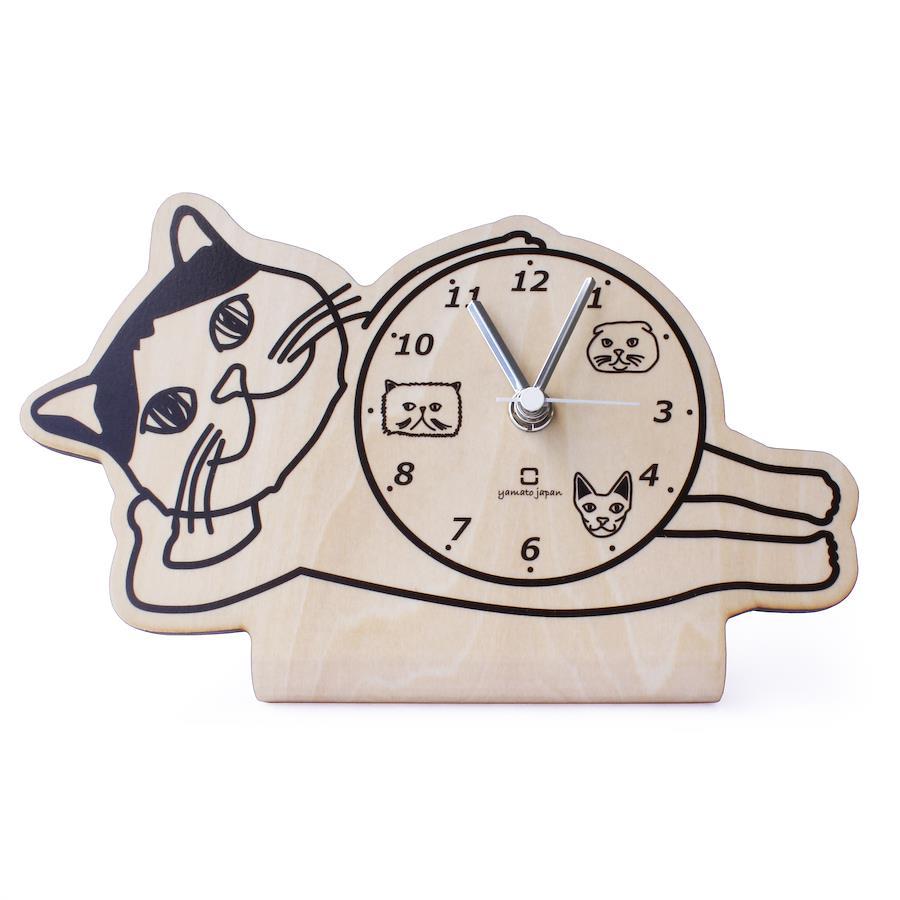 A table clock featuring the popular yamatojapan character CATS
A table clock featuring the popular yamatojapan character CATS
Fukui is a treasure trove of natural beauty and unique local specialties. If you can't visit in person but are captivated by the city's charm, don't worry—you can still enjoy Fukui's delights from the comfort of your own home.
Thanks to over 3,000 local retailers partnering with the online marketplace ZenPlus, you can now access an impressive selection of over 5 million authentic Japanese products.
Imagine browsing and buying exclusive items from Fukui and other parts of Japan, all from your couch, and having them delivered right to your doorstep—it’s Japanese convenience at its best!

